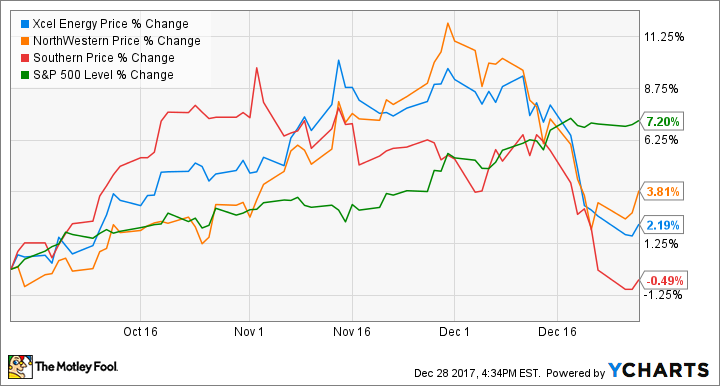Regulated utilities that thought the recently passed corporate tax cut would result in a profit windfall may be in for a big surprise. The first salvo in what is likely to become a barrage came when Montana regulators asked NorthWestern Corp.'s (NWE -1.38%) NorthWestern Energy utility to come up with a proposal for how it will use its tax reduction to benefit customers.
Wyoming's regulators have also brought up the topic, and we could soon see widespread pressure for regulated utilities across the country to cut customers significant breaks that parallel the one the companies received from the Republican tax overhaul. It's possible that the tax cut won't benefit many utility companies or their investors at all.

Image source: Getty Images.
Why regulated utilities may not see tax benefit
Regulated utilities aren't just regulated in the sense that the government watches over what they do: Their returns are regulated, too. So, when they get a big boost to their margins -- as they will now that Congress has cut the corporate tax rate from 35% to 21% -- the resulting higher profits cause state regulators to take notice.
Since utilities and regulators had set power rates to provide what they viewed as a reasonable profitability level based on the previous 35% tax rate, it makes sense that regulators would want to modify rates now.
But the benefit to customers may not come back solely in the form of rate cuts; companies may be allowed to make greater investments in energy access or safety, depending on where utilities and regulators jointly conclude the funds are needed. Montana's regulators didn't specifically demand lower rates: They gave the utility discretion to make a proposal, though it will have to show it's using the money to benefit customers.
So windfalls probably aren't coming, and whatever changes result from the corporate tax cut, the benefits may not make their way to utility shareholders.
Utility stocks are already feeling the impact
Below, I pulled the returns for utility stocks NorthWestern, Xcel Energy (XEL -0.58%), and Southern Co. (SO 0.62%). They all generally tracked the S&P 500's return from October to mid December, but when the Republican tax bill passed, their share prices fell off a cliff.
It's not certain that the drop was due to utilities having to adjust their return expectations because of the tax law, but the timing of the synchronized tumble suggests that investors were adjusting their expectations based on its anticipated impact.
Taxes are the least of utilities' problems
Beyond the fact that the tax windfall may not be as big as utilities hoped, these companies are dealing with growing threats to their business models. The advent of cost-effective rooftop solar power systems has allowed large numbers of customers to produce their own electricity. In 2018, we'll likely see more economical energy storage add to utilities' difficulties by allowing commercial and residential customers to lower their bills despite the dynamic pricing and other rate structures put in place by utilities to combat the advance of the solar energy industry.
There's just no reason to think that regulated utilities will increase profits in the long term as these threats become more mature and widespread. So, if their short-term profitability outlook isn't great either, it's not a good sign for utility stocks.


